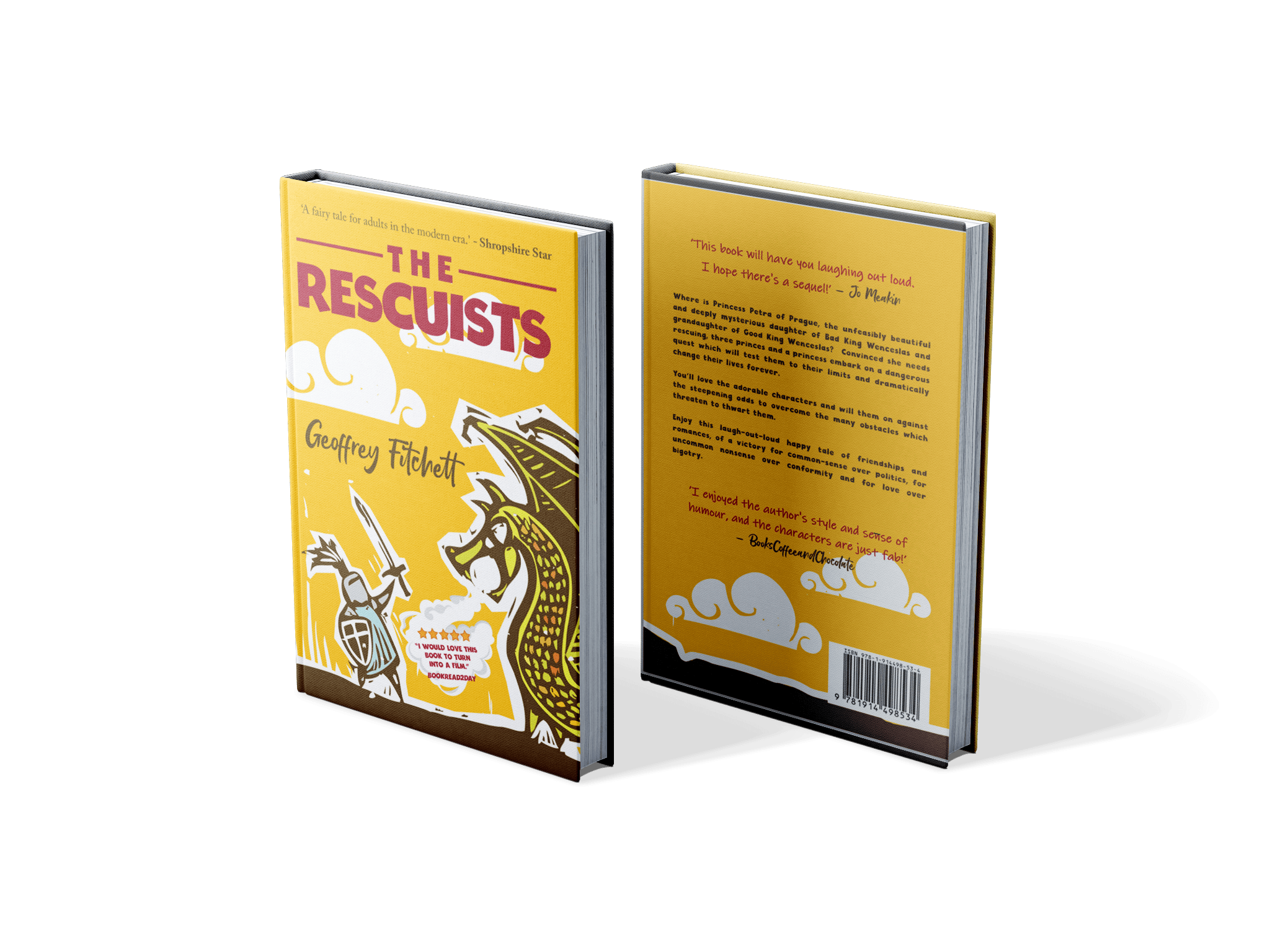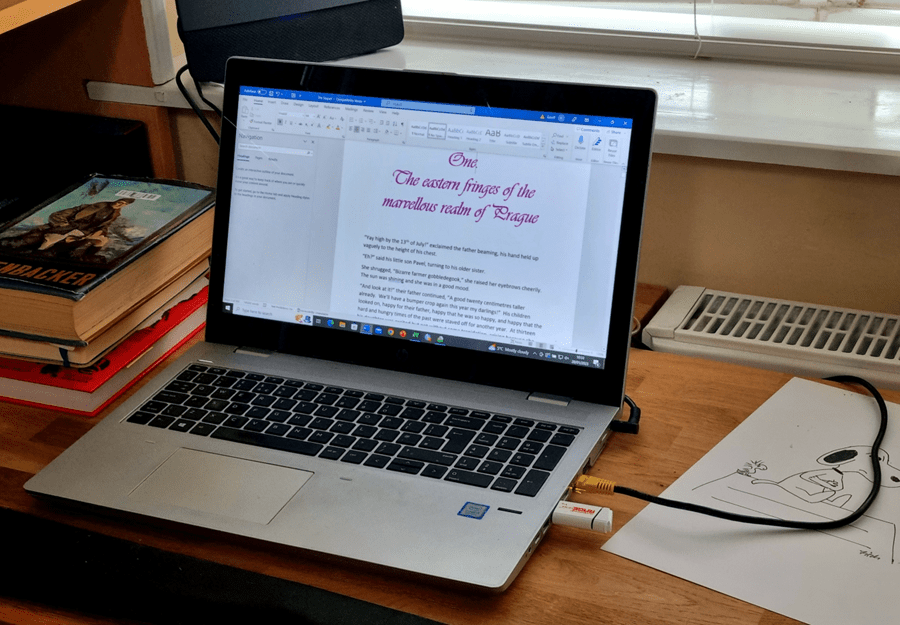
Get in touch +44 (0) 7885 722822 or geoff@geofffitchett.com


No sooner had the first few people read The Rescuists than requests for a sequel began to appear in my inbox. It might be pleasant to imagine the flattered author gazing wistfully into the middle-distance, surprised by the request, brow furrowed for a few moments until he is bursts into activity. First, unscrewing the squeaky top to his Pilot Iroshizuku ink (a gorgeous shade of yama-budo) and then by scratching swirls onto parchment, the next adventure for the jolly band of Praguers begins. Yeah, no, that’s not what happened. I was able to inform even the hastiest of enquirers that the sequel was already underway.
Long before I finished writing The Rescuists over November and December of twenty-one, I knew there was more to come from the characters. The vaporous threads that loosely described their next adventure were already circling in my head, and while some folks assumed the sequel would be about Petra’s adventures during her absence from home, I had already decided that particular story would form the basis of the third book. True to the idea of a sequel, the second would follow the first, while the third would be a kind of prequel.
As I write this, I can tell you that although the sequel is unfinished (perhaps by a final quarter, possibly a tad more), it is already considerably longer than its predecessor. I know this will exasperate my publisher because the profession prefers (nay, insists) novels to be a prescribed length, but hey-ho!
Of course, hey-ho is neither an excuse, nor an apology. Nor is it a satisfactory justification for a book being long-winded, but it is more than ill-discipline and a lack of self-control which results in a higher word-count. To me, a book is something in which the reader immerses themself. My reader may live in the suburbs of Montevideo, above the shop in which she works long, long hours, but at night she is transported back a thousand years to Prague and into the company of some big-hearted and passionate young people. They are fun (and sometimes funny), some are preposterous, some are wise, some are otherwise. When we read about them, we know whose side we are on and in my stories the reader is safe because good wins over evil – though there may be a price to be paid along the way. On balance, there is more good karma than bad.
Lost in the book, the precious reader forgets the real world entirely and whether her daily existence is fabulous or not, the book in her hand is a delightful distraction. She looks forward to reading it. In fact, she looks forward to bedtime just so she can read it. Projecting my own reading experiences on to her for a moment, I would go as far as to say that if she’s really, really enjoying it, she neither wants to put it down, nor does she want it to end.
If her book is good, she won’t thank the publisher for keeping it within prescribed bounds, for harshly editing it to be more concise, making it shorter to save the reader some reading time and the printer some pages. It’s human nature that if you like something, you want more.
Because Friends was such good telly, the makers gave the world 236 episodes. It has been a source of great joy, making people happy since the first show aired nearly thirty years ago and episodes still flicker on our screens today in any of 100 countries. Fawlty Towers may well have been a work of utter genius, but the BBC managed only twelve episodes and that remains a terrible shame.
So anyway, hey-ho, more is more, the sequel may be longer than average but it is the director’s cut not the shorter edited-for-TV version, it is the twelve-inch extended remix not the radio edit.
In bookshops, fat books are less appealing to prospective buyers than moderately thin ones. There are also price implications in writing more and longer chapters because a book with 400 pages costs lots more to print than one with 200. From a purely commercial standpoint, longer books are less likely to sell well. The experts tell us this is true no matter how many long stories have become staples. And yet, as I cast my eye across my own bookshelves, it’s obvious that many of my favourites would not meet the stipulated 80,000 – 100,000 wordcount.
You can imagine my publisher looking annoyed, fingers steepled as she waits for her troublesome writer to agree to her recommendation that he heavily edit his manuscript. He (I), resembles Stan Laurel, caught out by a stern Oliver Hardy. Eyebrows rising and falling, Stans’s face adopts a variety of perplexed visages, none of which demonstrate the least bit of comprehension or cooperation and as the editor’s austere expression darkens, the pressure builds on Stan until a stream of barely intelligible words stream forth. Just about catching it you hear, “Don’t look at me, I didn’t write it! It’s not my fault it’s too long, I just sit there while all the words come out of my fingers. You need to tell them not to talk so much!” and with that he gestures dramatically to a life-size cardboard cut-out of our intrepid heroes which sits in the corner of her office. “Maybe they shouldn’t get up to such japes or meet so many interesting people? If their lives weren’t so busy the book would be shorter. Tell them, don’t tell me!” Avoiding her exasperation and disapproval, he stares again at the cardboard characters he loves. They are leaning slightly to one side, used once at a book launch and now partially blocking her view of the Thames. Lofty Adalbert’s head has a fold in it, suggesting the giant piece of point-of-sale material spends most of its time compressed into the cleaning closet until the author rides his scooter to her office, at which point it is dragged out, dusted off and attempts are made to press the crease in Adalbert’s head flat. Even now Adalbert begins to stoop as the weeks of being folded at chin height take their toll. He appears to be the only one feeling the author’s pain.
“Well, at this length it’s going to be very expensive. We’ll be lucky to sell more than a few hundred so don’t expect much in the way of royalties because I think it’s a big mistake.” She leaves a pause but Stan is deflated and just blinks like a scolded puppy. “And frankly,” she continues, “If you are going to ignore my advice, I have to wonder why I bother giving it!” Inferring only that she had agreed to proceed, the author grins at her with unimpinged delight, then sensing the gulf between them, returns his gaze the cardboard entourage. He half-expected Adalbert’s head to have lifted and for all the young royals to have smiles on their faces. Has Adalbert’s head lifted? No, it hasn’t (and yet, has it?) and yes, they certainly are smiling. Everything is fine then, and inappropriately delighted, he thanks the exhausted publisher and leaves the room, but not before waving at the group of cardboard characters. “Do you want to take that home?” she asks. “No, I came by scooter,” he answers. She nods, then looks a worried-kind-of-puzzled when he adds, “And I only have the one crash helmet.”
This sense of disconnection from the piece of work they have produced (and consequent absolution of guilt) is, I believe, a common hallucination among authors. It wasn’t simply that I wanted to write a sequel, more that the characters had been brought to life and now just kept on living. While I worked on getting The Rescuists published, they were busy carrying on with their lives in their own parallel universe. It isn’t simply that I couldn’t stop them, it is that they fascinate me and I love them. They are part of the family, and they feel very real.
If the reader feels this way, I am inclined to think the author has succeeded.
The plot for the sequel. Well, I have no intention of spoiling things, so all I’ll say here is that there is an existential threat to the kingdom and our intrepid band must work together to protect their way of life and the homes they have made in the marvellous realm of Prague.
The reader will discover that their lives are as subject to the progress of time and events as our own. Things happen to them and around them. New characters emerge, some are dastardly troublemakers, others are new friends, a few are really neither and just slot in as the necessary cast required to complete the story. Your favourites from The Rescuists remain front and centre among the expanded ensemble and some of the additional weight of words is dedicated to learning more of their individual histories. Be warned though, there is a real chance that not everyone will survive.
The Rescuists began one Sunday morning in November twenty-one as a story for a child. Within a day of writing it had changed into a story which perhaps might be read to a child. Within a few chapters is had acquired a PG certificate and in fact, would probably best suit people of fifteen and up. It evolved in a way which was unplanned and in that respect the sequel does not, simply picking up within months of where The Rescuists left off.
There is only one swear word in The Rescuists. The king shouts the F-bomb at someone after her deeply unpleasant verbal assault on the people we adore. She is small-minded and (apparently) racist too and the king explodes. In the sequel there are many more swear words and in fact one character – who as I wrote him, turned into a part Danny DeVito might have played (brilliantly) in days gone by – swears incessantly. There are a few sexual allusions in The Rescuists, but little which is blatant and there is no description, but this gets jacked up in the sequel too. Not only because of the handful of readers who cited it as a disappointing omission, but also because a little more low-level description felt necessary this time. Even so, there are no actual sex-scenes as such, just a bit more honesty in the storytelling of their lives.
There is also more violence. The sequel is funny but also has a bit more death and destruction. It is every bit as light, but with added darkness. It is as warm and wholesome as The Rescuists but has a more brutal edge. It is The Rescuists expanded in all directions, not just in size but in other ways too. We had a mild curry and loved it. This time we’re going back and asking for a bit more spice. Excite my tastebuds, make it just a little bit dangerous! And instead of my usual zero-alcohol Heineken I’m ordering a few pints of Cobra… Bring it on!
And that’s all I’m going to say about it for now, other than, however dark it gets, almost everything and almost everyone will be alright in the end. So, feel free to write to me and ask questions. If I can answer them without spoiling anyone else’s reading, I will.